2023 William Hill Sports Book of the Year – Shortlist
The 35th winner of the William Hill Sports Book of the Year is announced tomorrow with the winner coming from the shortlist of six books. Despite football having half of the longlist of twelve titles, none of them made it through to the final judging and instead the winner will come from the books below.
 Unfair Play: The Battle For Women’s Sport by Sharron Davies & Craig Lord
Unfair Play: The Battle For Women’s Sport by Sharron Davies & Craig Lord
On the face of it, women’s sport is on the rise, garnering more attention and grassroots involvement than ever before. However, the truth is that in many respects progress is stalling, or even falling back.
Sharron Davies is no stranger to battling the routine sexism the sporting world. She missed out on Olympic Gold because of doping among East German athletes in the 1980s and has never received justice. Now, biological males are being allowed to compete directly against women under the guise of trans ‘self-ID’, a development that could destroy the integrity of female sport. This callous indifference towards women in sport, argue Sharron and journalist Craig Lord, is merely the latest stage in a decades-long history of sexism on the part of sport’s higher-ups.
A strong fightback is required to root out the lingering misogyny that plagues sporting governance, media coverage and popular perceptions. This book provides the facts, science and arguments that will help women in sport get the justice they deserve.
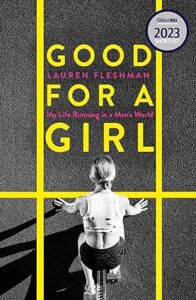 Good For A Girl: My Life Running in a Man’s World by Lauren Fleshman
Good For A Girl: My Life Running in a Man’s World by Lauren Fleshman
Lauren Fleshman was of the most decorated collegiate athletes of all time and a national champion as a pro, before becoming a coach for elite young female runners. Every step of the way, she has seen how our sports systems fail young women and girls as much as empower them.
Part memoir, part manifesto, Good for a Girl is Fleshman’s story of falling in love with running as a girl, battling devastating injuries and self-doubt, and daring to fight for a better way for female athletes.
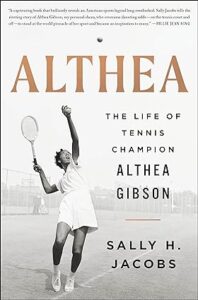 Althea: The Life of Tennis Champion Althea Gibson by Sally H. Jacobs
Althea: The Life of Tennis Champion Althea Gibson by Sally H. Jacobs
The biography of Althea Gibson, the street savvy young woman from Harlem who broke the colour barrier in tennis with her remarkable skill on the court.
In 1950, three years after Jackie Robinson first walked onto the diamond at Ebbets Field, the lily white, upper-crust National Lawn Tennis Association opened its door just a crack to receive the powerhouse player who would integrate “the game of kings”: Althea Gibson.
A street-savvy young woman from Harlem, Gibson was about as alien in that rarefied white world as an aspiring tennis champion could be. In her tattered jeans and short-cropped hair, Gibson drew stares from both sides of the colour fence. But her astonishing skill on the court soon eclipsed all of that, as she eventually became one of the greatest tennis champions the United States has ever produced.
Gibson had a stunning career: She won top honours at Wimbledon and Forest Hills time and time again. As her star rose, the underestimated high school dropout shook hands with the Queen of England, was driven up Broadway in a snowstorm of ticker tape, was on the front of Time and Sports Illustrated?the first Black woman to appear on the covers of both magazines?and was named the number one female tennis player in the world.
In Althea, prize-winning former Boston Globe reporter Sally H. Jacobs tells the heart-rending story of this pioneer. This first full biography of a remarkable woman reminds the world that Althea Gibson was a trailblazer, a champion, and one of the most remarkable Americans of the twentieth century.
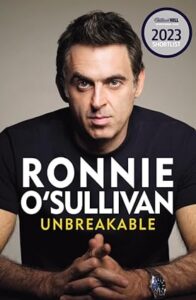 Unbreakable by Ronnie O’Sullivan
Unbreakable by Ronnie O’Sullivan
In a career spanning over three decades, Ronnie O’Sullivan’s journey to becoming the greatest snooker player of all time has been filled with extremes.
A teenage snooker prodigy, Ronnie turned professional with the highest of expectations. This pressure, together with a challenging personal life, catapulted Ronnie into a life of excess and addiction. He was winning titles – his first within a year of turning professional – but losing himself and his game as he tried to block out the mental pain and misery. Whilst Ronnie appeared at the height of the game to spectators, these were the moments when he felt at his lowest.
In the year 2000 Ronnie started rehab and began the journey to get his life back, addressing his demons and working on developing a stronger and more resilient mindset. More than twenty years on, Ronnie is still obsessed with delivering his peak performance and never happier than when in a snooker hall, but success has now taken on a new meaning for the record-equalling world champion.
Framed around the many lessons Ronnie has learned from his extraordinary career, Unbreakable takes us beyond the success and record-breaking achievements to share the reality – and brutality – of making it to the very top, whatever your field. Ronnie is the first to say he doesn’t have all the answers, but in sharing the experiences that have shaped him and mistakes that have made him, he hopes to help readers navigate their own personal challenges and obstacles, and in turn reach their maximum potential.
This is Ronnie O’Sullivan as you’ve never seen him before, the definitive and unflinching story of a true British icon and a fascinating insight into the mindset of the world’s greatest snooker player.
 Concussed: Sport’s Uncomfortable Truth by Sam Peters
Concussed: Sport’s Uncomfortable Truth by Sam Peters
By recounting the untold story of the most influential sports campaign in British newspaper history, which turned concussion in professional rugby from a niche issue into front and back page news, Concussed poses the questions all sports lovers need answering as evidence grows linking sports-related concussions to premature deaths and dementia.
Expanding his research from rugby to football, NFL and other contact sports, Sam Peters brings an unparalleled breadth of experience, depth of knowledge and journalistic rigour to a subject he has written about and campaigned over for a decade.
Now sport’s ‘dirty secret’ is out in the open, Peters asks: how can rugby and other sports save themselves from the vested interests which threaten their very existence?
 Kick The Latch by Kathryn Scanlon
Kick The Latch by Kathryn Scanlon
Kathryn Scanlan’s Kick the Latch vividly captures the arc of one woman’s life at the racetrack – the flat land and ramshackle backstretch; the bad feelings and friction; the winner’s circle and the racetrack bar; the fancy suits and fancy boots; and the ‘particular language’ of ‘grooms, jockeys, trainers, racing secretaries, stewards, pony people, hotwalkers, everybody’ – with economy and integrity.
Based on transcribed interviews with Sonia, a horse trainer, the novel investigates form and authenticity in a feat of synthesis reminiscent of Charles Reznikoff’s Testimony. As Scanlan puts it, ‘I wanted to preserve – amplify, exaggerate – Sonia’s idiosyncratic speech, her bluntness, her flair as a storyteller. I arrived at what you could call a composite portrait of a self.’ Whittled down with a fiercely singular artistry, Kick the Latch bangs out of the starting gate and carries the reader on a careening joyride around the inside track.
Good luck to all the writers.

 Three Games in May takes us all the way back to Manchester United’s final three matches of the 1998/99 season.
Three Games in May takes us all the way back to Manchester United’s final three matches of the 1998/99 season.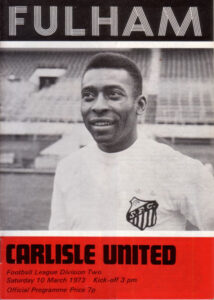 The debate about the Greatest of All Time will continue as long as the game of football is played and thanks to the internet, footage of those greats from down the years allows us to compare players from different eras. However, there is nothing like being able to say that you saw them play in the flesh. And I can humbly say that I was able to see ‘live’ the player who at the time was probably the most famous and greatest player on the planet – Edson Arantes do Nascimento or as the world knew him – Pele.
The debate about the Greatest of All Time will continue as long as the game of football is played and thanks to the internet, footage of those greats from down the years allows us to compare players from different eras. However, there is nothing like being able to say that you saw them play in the flesh. And I can humbly say that I was able to see ‘live’ the player who at the time was probably the most famous and greatest player on the planet – Edson Arantes do Nascimento or as the world knew him – Pele.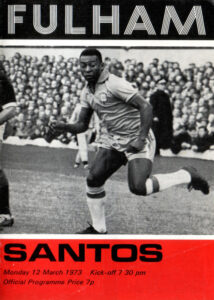 Given that there would be a bumper crowd we got seats in the Stevenage Road Stand rather than our usual spot on the Putney End terrace. Fulham averaged just over 10,000 in the league that season, but for the Santos game it was officially recorded as 21,464 – the biggest attendance I’d seen at the Cottage up till then.
Given that there would be a bumper crowd we got seats in the Stevenage Road Stand rather than our usual spot on the Putney End terrace. Fulham averaged just over 10,000 in the league that season, but for the Santos game it was officially recorded as 21,464 – the biggest attendance I’d seen at the Cottage up till then.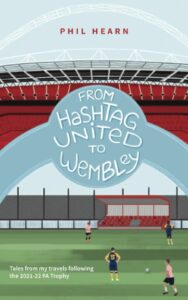 Ask people, even those not interested in football, and they will have heard of the FA Cup – the oldest national football competition in the world, which began in 1871. Ask the same group about the FA Trophy and you will no doubt be met with a great number of blank faces. And in explaining to anyone about this competition, like to road to Wembley itself, it can be a tricky task.
Ask people, even those not interested in football, and they will have heard of the FA Cup – the oldest national football competition in the world, which began in 1871. Ask the same group about the FA Trophy and you will no doubt be met with a great number of blank faces. And in explaining to anyone about this competition, like to road to Wembley itself, it can be a tricky task.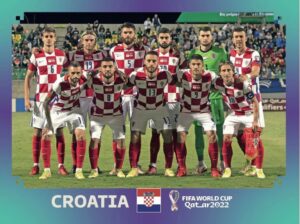 Croatia 2 (2) – (1) 1 Morocco (Khalifa International Stadium, Al Rayyan)
Croatia 2 (2) – (1) 1 Morocco (Khalifa International Stadium, Al Rayyan) I was born in a World Cup year (1962) but that was two months after Brazil completed a 3-1 victory over Czechoslovakia. 1966, despite my dad’s insistence that I watched the final, holds no memories at all. It wasn’t until 1970 that I have any vague recollection and that was on holiday in Torquay when the whole hotel, staff and guests, gathered to see England lose 3-2 and give up their title as World Champions. Four years later (given World Cups were held in summer prior to 2022), the heavy rain that affected the tournament in West Germany stands out and whilst the hosts won 2-1 in the final I was carrying out my cricket scoring duties for my dad’s team away at Chipstead & Coulsdon so seeing very little of the action. 1978 was O-level year and I readily admit I had more interest in the events in Argentina than my text books. I remember watching the final mesmerised by the tickertape that showered down from the stands, willing the Netherlands to win – alas it was not to be as Argentina won 3-1 in extra time.
I was born in a World Cup year (1962) but that was two months after Brazil completed a 3-1 victory over Czechoslovakia. 1966, despite my dad’s insistence that I watched the final, holds no memories at all. It wasn’t until 1970 that I have any vague recollection and that was on holiday in Torquay when the whole hotel, staff and guests, gathered to see England lose 3-2 and give up their title as World Champions. Four years later (given World Cups were held in summer prior to 2022), the heavy rain that affected the tournament in West Germany stands out and whilst the hosts won 2-1 in the final I was carrying out my cricket scoring duties for my dad’s team away at Chipstead & Coulsdon so seeing very little of the action. 1978 was O-level year and I readily admit I had more interest in the events in Argentina than my text books. I remember watching the final mesmerised by the tickertape that showered down from the stands, willing the Netherlands to win – alas it was not to be as Argentina won 3-1 in extra time. 1990 saw me in my own place with my then wife and as an England fan their progress was keenly followed, World in Motion et al. The final was watched at home but was an incredibly drab affair, the only consolation being that West Germany beat the dreaded Argentinians. England failed to make it to the USA in ’94 and I failed to watch the final, a tournament I just couldn’t get into.
1990 saw me in my own place with my then wife and as an England fan their progress was keenly followed, World in Motion et al. The final was watched at home but was an incredibly drab affair, the only consolation being that West Germany beat the dreaded Argentinians. England failed to make it to the USA in ’94 and I failed to watch the final, a tournament I just couldn’t get into.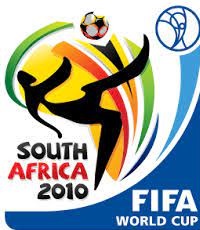 The 2010 tournament saw it hosted by South Africa, where England managed to limp through to the last sixteen only to be dumped out 4-1 by Germany, with us all screaming at our tv’s as Frank Lampard’s ‘ghost’ goal vanished into the ether. Notable for Luis Suarez unsporting celebration of the missed Ghana penalty and Netherlands physical approach in the final, it was another final watched sat at home, with my playing days long behind me.
The 2010 tournament saw it hosted by South Africa, where England managed to limp through to the last sixteen only to be dumped out 4-1 by Germany, with us all screaming at our tv’s as Frank Lampard’s ‘ghost’ goal vanished into the ether. Notable for Luis Suarez unsporting celebration of the missed Ghana penalty and Netherlands physical approach in the final, it was another final watched sat at home, with my playing days long behind me.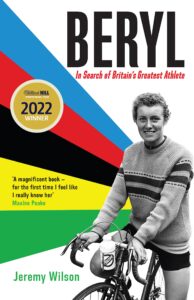 Football may have had two titles in the shortlist of five finalists – Be Good, Love Brian: Growing Up with Brian Clough by Craig Bromfield and Expected Goals: The Story of how Data Conquered Football and Changed the Game Forever by Rory Smith – but it was Beryl – In Search of Britain’s Greatest Athlete, Beryl Burton by Jeremy Wilson that took the top prize.
Football may have had two titles in the shortlist of five finalists – Be Good, Love Brian: Growing Up with Brian Clough by Craig Bromfield and Expected Goals: The Story of how Data Conquered Football and Changed the Game Forever by Rory Smith – but it was Beryl – In Search of Britain’s Greatest Athlete, Beryl Burton by Jeremy Wilson that took the top prize. Yet she carried on winning, beating men and – infamously – competing against her own daughter, while working on a farm and running a household. Her motivation, sparked by appalling childhood illness, is as fascinating as her achievements are stunning.
Yet she carried on winning, beating men and – infamously – competing against her own daughter, while working on a farm and running a household. Her motivation, sparked by appalling childhood illness, is as fascinating as her achievements are stunning. Two football titles have made this year’s Shortlist, with Beryl by Jeremy Wilson looking at the life of cycling champions Beryl Burton, God is Dead by Andy McGrath capturing the chaotic life of cyclist Frank Vandenbroucke and the story of athlete Anyika Onuora, My Hidden Race making up the five book Shortlist.
Two football titles have made this year’s Shortlist, with Beryl by Jeremy Wilson looking at the life of cycling champions Beryl Burton, God is Dead by Andy McGrath capturing the chaotic life of cyclist Frank Vandenbroucke and the story of athlete Anyika Onuora, My Hidden Race making up the five book Shortlist.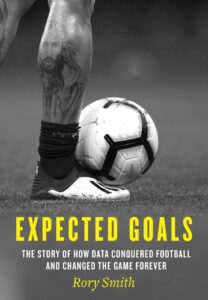 Expected Goals: The Story of how Data Conquered Football and Changed the Game Forever by Rory Smith
Expected Goals: The Story of how Data Conquered Football and Changed the Game Forever by Rory Smith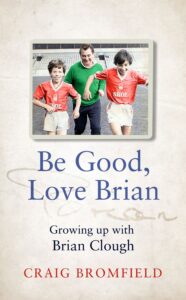 Be Good, Love Brian: Growing Up with Brian Clough by Craig Bromfield
Be Good, Love Brian: Growing Up with Brian Clough by Craig Bromfield ed in the Euros final this summer, brushing all opposition, including former world champions Norway and Germany, spectacularly aside, there was only one match-up that women’s football fans longed for – England v USA.
ed in the Euros final this summer, brushing all opposition, including former world champions Norway and Germany, spectacularly aside, there was only one match-up that women’s football fans longed for – England v USA. Indeed, with lightning-fast Lauren Hemp up front, supported by England’s player of the year Beth Mead and Euros final heroine Chloe Kelly out wide, the first fifteen minutes of the match in particular were some of the best football Wembley has seen – a real showcase not of the ‘women’s game’ but simply of football. And it was makeshift striker Hemp who broke the deadlock after just ten minutes, with the world champions visibly rocked and the European champions visibly in control.
Indeed, with lightning-fast Lauren Hemp up front, supported by England’s player of the year Beth Mead and Euros final heroine Chloe Kelly out wide, the first fifteen minutes of the match in particular were some of the best football Wembley has seen – a real showcase not of the ‘women’s game’ but simply of football. And it was makeshift striker Hemp who broke the deadlock after just ten minutes, with the world champions visibly rocked and the European champions visibly in control. Central to this, as so often in recent times, was midfielder Keira Walsh. Her performance was a masterclass in assurance and class. Positional awareness, control, quality, there are surely few better, if any, right now than the Barcelona recruit. And whilst the Lionesses have proved they are very much a fully functioning team, for me Walsh is arguably the most important piece of the jigsaw. Elsewhere, Lucy Bronze who always seems to rise to the occasion on the biggest of stages was back to her imperious best, whilst Lauren Hemp proved her value across the front line and Rachel Daly, who is plying her trade up front for Aston Villa and is currently their top goalscorer, demonstrated the versatility and athleticism that has made her a constant in Sarina Wigeman’s team. Once again, though, this team succeeds because of its collective intent and focus, each member playing her part.
Central to this, as so often in recent times, was midfielder Keira Walsh. Her performance was a masterclass in assurance and class. Positional awareness, control, quality, there are surely few better, if any, right now than the Barcelona recruit. And whilst the Lionesses have proved they are very much a fully functioning team, for me Walsh is arguably the most important piece of the jigsaw. Elsewhere, Lucy Bronze who always seems to rise to the occasion on the biggest of stages was back to her imperious best, whilst Lauren Hemp proved her value across the front line and Rachel Daly, who is plying her trade up front for Aston Villa and is currently their top goalscorer, demonstrated the versatility and athleticism that has made her a constant in Sarina Wigeman’s team. Once again, though, this team succeeds because of its collective intent and focus, each member playing her part.